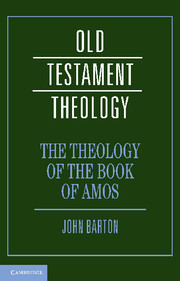Book contents
- Frontmatter
- Contents
- General Editors’ Preface
- Preface
- Abbreviations
- Chapter 1 Amos: The Critical Issues
- Chapter 2 Religious Belief and Practice in Amos’s Day
- Chapter 3 The Theology of Amos and His Circle
- Chapter 4 Theological Themes in the Additions to the Book of Amos
- Chapter 5 The Theology of the Book of Amos
- Chapter 6 The Reception of the Theology of Amos
- Chapter 7 The Theology of Amos Then and Now
- Further Reading
- Author Index
- Scripture and Apocrypha Index
- References
Chapter 2 - Religious Belief and Practice in Amos’s Day
Published online by Cambridge University Press: 05 June 2012
- Frontmatter
- Contents
- General Editors’ Preface
- Preface
- Abbreviations
- Chapter 1 Amos: The Critical Issues
- Chapter 2 Religious Belief and Practice in Amos’s Day
- Chapter 3 The Theology of Amos and His Circle
- Chapter 4 Theological Themes in the Additions to the Book of Amos
- Chapter 5 The Theology of the Book of Amos
- Chapter 6 The Reception of the Theology of Amos
- Chapter 7 The Theology of Amos Then and Now
- Further Reading
- Author Index
- Scripture and Apocrypha Index
- References
Summary
Amos was Israel’s first theologian. As far as we know, no one before him had subjected the religious beliefs and practices of people in Israel to critical scrutiny. His message was delivered in short, pithy sayings, but they were soon collected into larger complexes: I have suggested that not too long after his prophetic activity there existed three collections: the oracles against the nations (now found in chapters 1–2), an anthology of sayings (chapters 3–6), and a cycle of visions (chapters 7–9). In these, we encounter a strikingly original figure, with an uncompromising message of impending doom justified by a moral analysis of society and of the wider political world, even on an international scale.
According to 7:14, Amos was an agriculturalist, probably a sheep breeder rather than a simple shepherd. From the oracles preserved in the book, we can see that he had an education. This is apparent not only from the fact that he was able to produce oracles in well-formed Hebrew verse, but also because he sometimes used types of sayings that are really at home in the non-prophetic sphere, such as the funeral lament (5:1–2) and the numerical proverb (1:3). If he did not write himself – and there is no way of knowing whether he did or not – then he had literate disciples who were able to compile his sayings into coherent collections and to produce the core of the present book as an orderly whole. Evidence that his oracles were known to Isaiah later in the eighth century suggests that written transmission ensured that his oracles became known outside the immediate circle of his followers.
- Type
- Chapter
- Information
- The Theology of the Book of Amos , pp. 52 - 69Publisher: Cambridge University PressPrint publication year: 2012

